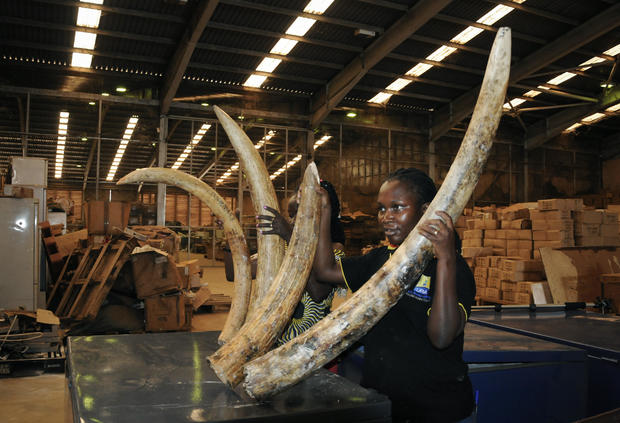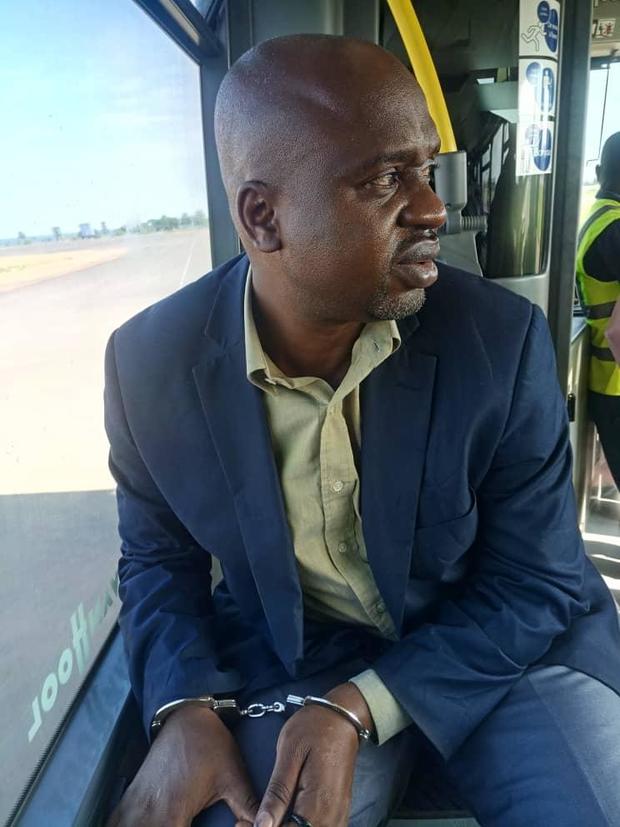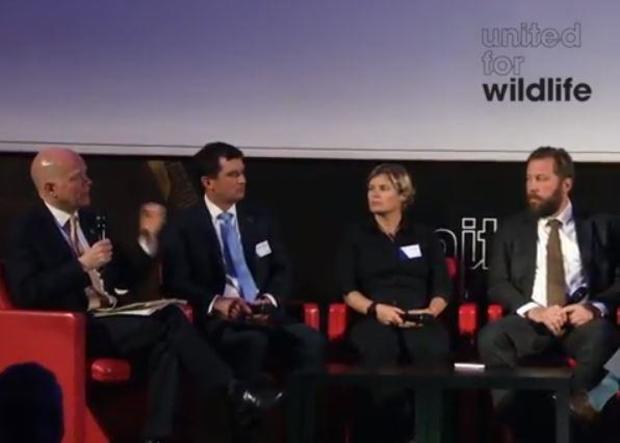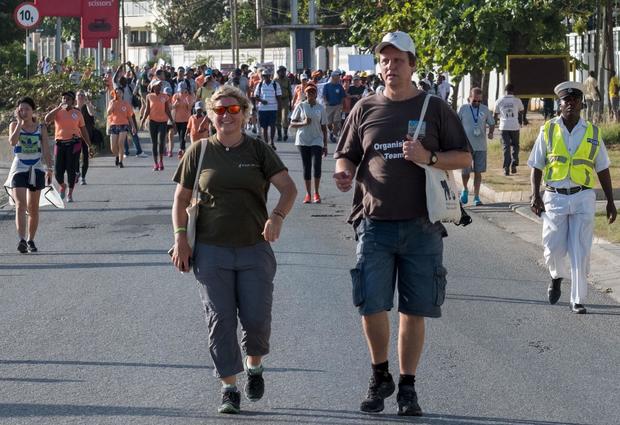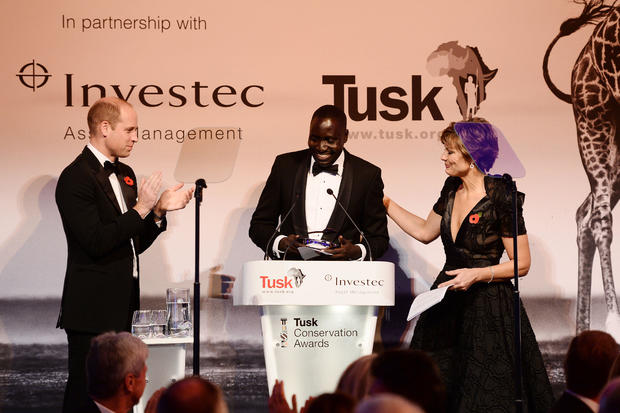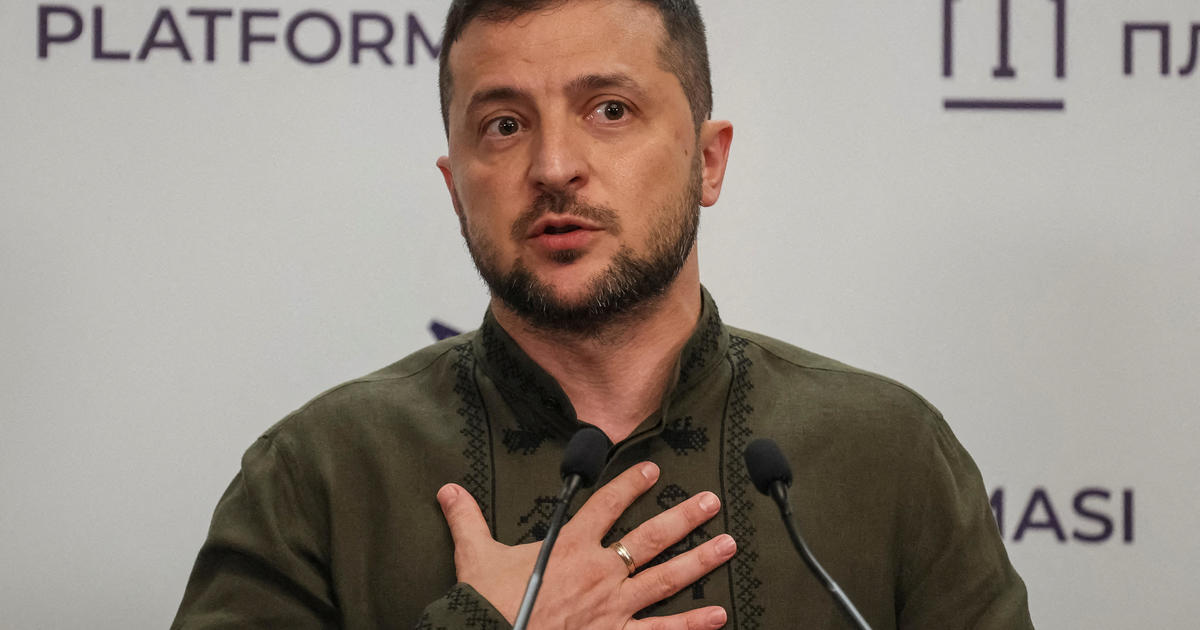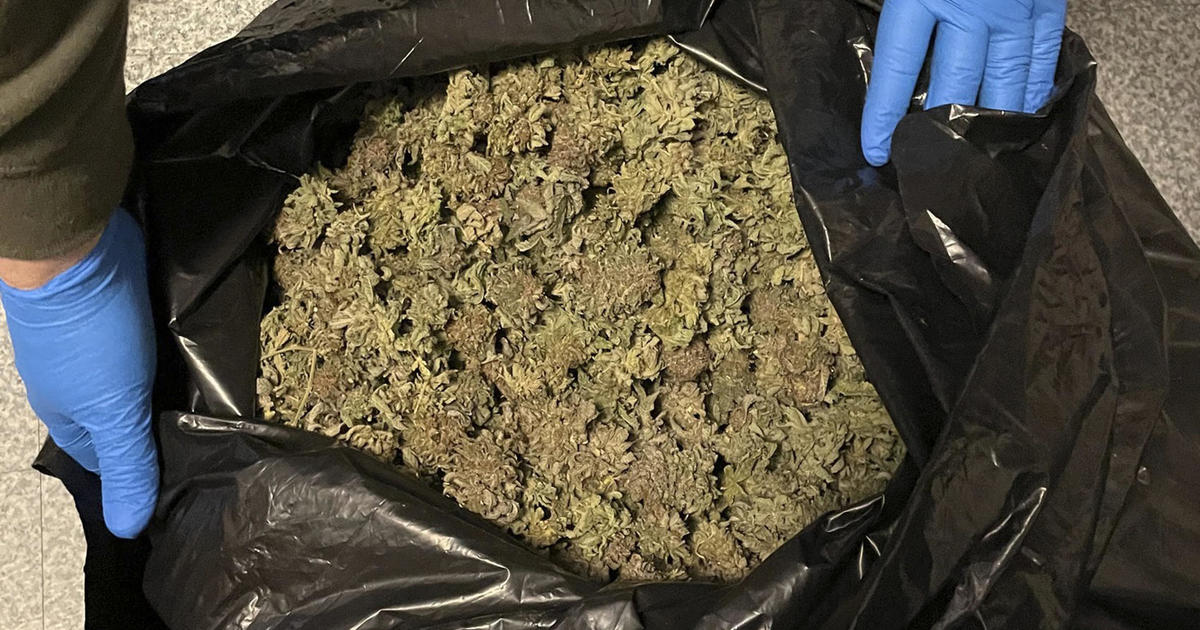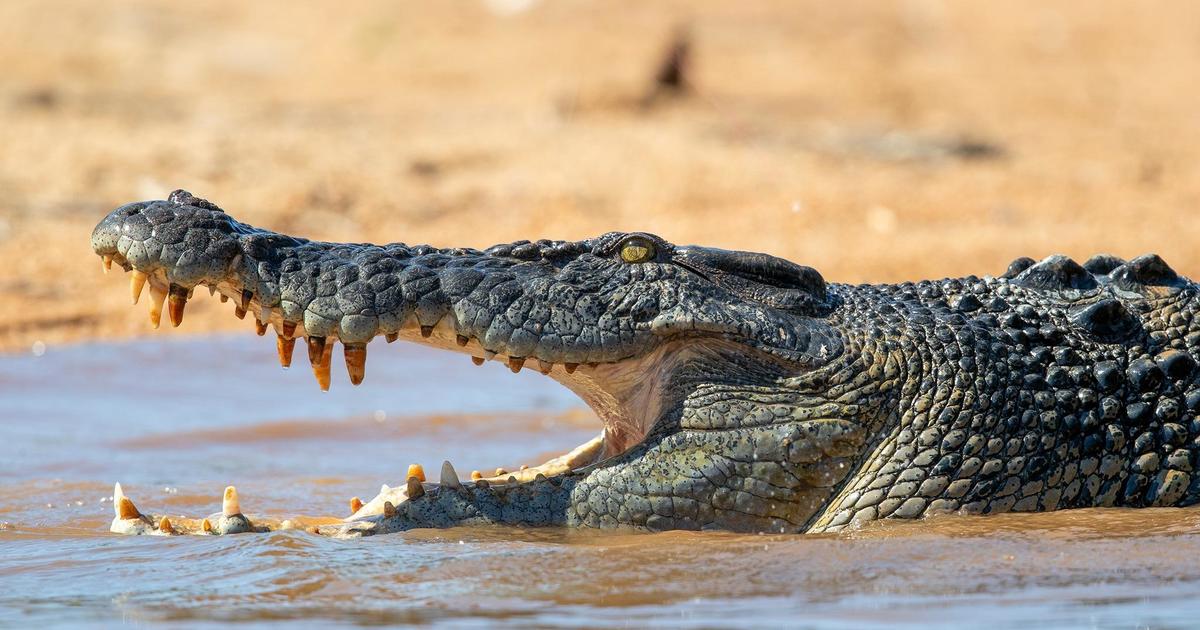How Prince William helped U.S. agents bust a major wildlife and drug smuggling network
U.S. law enforcement agencies have taken down a smuggling network accused of trafficking at least $7 million dollars worth of rhino horn and elephant tusk — as well as heroin — around the world. The bust is the first major success for a small group of people trying to shift the narrative on the illegal wildlife trade. These indictments are proof, they say, that the criminals who threaten the world's endangered species are also a direct threat to our safety as humans.
Charges were unsealed Thursday by the office of the U.S. Attorney for the Southern District of New York against four individuals accused of running the smuggling ring. They face charges including conspiracy to traffic in protected species and narcotics, and money laundering.
"As alleged, these defendants are members of an international conspiracy to traffic in not only heroin but also rhino horns and elephant ivory. The alleged enterprise, responsible for the illegal slaughter of dozens of rhinos and more than 100 elephants, was as destructive to protected species as it was lucrative," said Manhattan U.S. Attorney Geoffrey S. Berman in a statement released by the Southern District on Thursday. "The excellent work of the Fish and Wildlife Service and the DEA has put the brakes on an operation that allegedly peddled dead protected species and potentially deadly narcotics."
The charges were unsealed just hours after one of the key suspects, Liberian national Moazu Kromah, who went by a number of aliases including "Kampala Man," was arrested in Uganda and "expelled to the United States."
It was a joint operation by the U.S. Drug Enforcement Administration and the U.S. Fish and Wildlife Service, working in partnership with African authorities. One other suspect was being held by authorities in Senegal, pending a U.S. extradition request, and two others remained at large.
The indictments allege that the four men ran the operation from around the end of 2012 until just weeks ago, "to transport, distribute, sell, and smuggle" rhinoceros horn and ivory "from or involving various countries in East Africa, including Uganda, the Democratic Republic of the Congo, Guinea, Kenya, Mozambique, Senegal, and Tanzania, to buyers located in the United States and countries in Southeast Asia."
New thinking
It is a law enforcement victory, but the arrests also reflect a huge shift in strategy on tackling the global illegal wildlife trade which, to some degree, was sparked by Britain's Prince William.
About four years ago, the Duke of Cambridge, a longtime proponent of wildlife conservation, recognized that stopping poachers wasn't enough. If the world's iconic species were to be saved, it was time to follow the money.
Decades of charity-driven conservation efforts have failed to curb the problem, and the trafficking of illegal wildlife products has flourished into the 4th biggest illicit trade on the planet.
Analysts say the trade in pangolin scale, ivory, rhino horn, protected timber and everything in between nets between $100 and $150 billion per year, and that money helps fund virtually every other kind of organized crime on the planet, including terrorism.
The status quo, dubbed "performative conservation" by one IWT expert, has been fueled by celebrity endorsements and massive donations to well-known charities. It has undeniably helped to save thousands of animals and put dozens of poachers in jail. But poachers are the grunt workers of the IWT industry; they are often freed quickly and are easily replaced, while the people really running the operations, long considered the "untouchables," have remained free.
Prince William, already one of the most recognizable faces in the conservation world, recognized the need to go after the big fish, and last month he told a group of business, law enforcement and NGO leaders gathered in London that his Royal Foundation's initiative, United for Wildlife (UFW), had struck upon a winning formula.
UFW launched two "Taskforces," which, through partnerships with some of the world's biggest shipping, transport and financial companies, have helped law enforcement agencies to connect the dots between the people killing animals, moving the illicit goods to the black market, and then profiting from them. Crucially, they have also helped expose the deep links between those networks and the ones that move other illegal goods around the world, as evidenced by the indictments unsealed Thursday in New York.
It's not a new model in law enforcement. It has been used for decades against global drug trafficking networks — but the case in New York is the first solid proof that the techniques and strategies that brought kingpins like Pablo Escobar and El Chapo to justice can also bring the full weight of the U.S. justice system to bear against the "untouchables" of the international wildlife trade.
Here is why it's different, and how it works.
Why: "An issue of national security"
The Duke of Cambridge is the headliner for the Taskforces, but the people who actually make it work, the ones who connect the dots, come from the worlds of law enforcement, intelligence analysis and traditional wildlife conservation.
Special Agent David Hubbard is in charge of international law enforcement operations for the U.S. Fish and Wildlife Service (FWS), the U.S. federal agency tasked with protecting endangered species not just in America, but around the world. He was at the joint meeting of the Taskforces in May, where he told CBS News that illegal wildlife trafficking networks "absolutely, 100%" have links to the ones that move guns, narcotics and even human beings illegally around the world.
"It's an issue of national security," Hubbard said.
"Every terror organization funds their activities through other illegal activities," he said. If you "look up the chain, it's the same people moving the money and the goods."
But officials have come to see the fight against the illegal wildlife trade not merely as another way to combat those diverse criminal enterprises, but as their Achilles' heel.
Lord William Hague, a long-time U.K. parliamentarian and former cabinet member who now chairs the United for Wildlife Taskforces, called wildlife smuggling the "soft underbelly" of the world's interlinked criminal trafficking networks. They are considered less sophisticated than the drug or weapons smuggling operations, for instance, because they haven't been as effectively targeted. Until now.
How: "Sharing of information"
"Within a short period of time, the Taskforces have added significant value to law enforcement efforts through effective sharing of information," Hubbard said. "We now have relationships in transport and banking that we never had before."
Building those relationships and facilitating the flow of information between law enforcement agencies and the private sector is the work of the Taskforces.
United for Wildlife launched the Transport Taskforce in December 2014. At least 117 transport firms — including major brands like DHL and Emirates Airline — have become members, signing the pledge to share data on dubious shipments and who is behind them when it could be linked to wildlife trafficking.
Last year the Financial Taskforce was launched to bring banks, money transfer companies and other currency movers into the effort. A total of 22 companies, including Standard Chartered, Bank of America and other big names in banking, have signed the commitment to train staff to detect financial anomalies potentially linked to wildlife trafficking, and to report them.
In just a few years the Taskforces have helped train some 55,000 employees at these companies to detect and report activity that could be linked to illegal wildlife products.
Hague said that helps make the Taskforces a "force multiplier." The Taskforces' intelligence analysts can take one small piece of information — a tip on a shipping container with dubious cargo, for example — and connect it with information on who paid the bill, and where it was going.
"Integrated approach"
The Taskforces rely on partnerships with traditional, grassroots conservation groups. As the locals working directly with, and in some cases managing the foot soldiers on the front lines against poaching and regional wildlife trafficking, their role is vital.
Krissie Clark co-founded the PAMS Foundation, a Tanzania-based conservation organization which has worked since 2009 to "to protect endangered species and environments," according to their mission statement.
In 2017 her PAMS co-founder Wayne Lotter was brutally murdered. He had received multiple death threats over his work with PAMS before being killed.
Clark works closely with the Taskforces. She told CBS News "if we really want to defeat this illegal wildlife trafficking, we have to go for the blood supply; we have to stop the money at the heart of this crime."
She said the United for Wildlife initiative is effective precisely because it "got the private sector involved… it's really got to be an integrated approach."
Vincent Opyene runs the National Resource Conservation Network in Uganda, which also works closely with the Taskforces and U.S. law enforcement on an operational level.
His investigators have worked for years with the Uganda Wildlife Authority and local law enforcement to go after poachers and traffickers — work which saw him presented last year with a prestigious Tusk Conservation Award. But Opyene was often frustrated by the difficulty in taking his investigations beyond his own nation's borders. They simply didn't have access to data that would enable them to look further up the food chain.
"Our challenge in conservation has been inadequate collaboration, in terms of information sharing," Opyene told CBS News. "The Taskforces help us to follow the money."
"The brain stem"
Integrating the efforts and information of the private sector, law enforcement and NGOs is the responsibility of the Taskforces' Head of Intelligence and Analysis, Dr. Tim Wittig. He came to United for Wildlife after years of work as an intelligence analyst and expert on terrorism and illicit finance for the U.S. government and various private organizations, as well as several years in Africa working as a field conservationist.
Wittig said conservation had been based for too long on strategies divorced from the complex realities of the wildlife trafficking problem, and he believed the Taskforces could help change the paradigm.
In his presentation to the gathering in London, Wittig described the Taskforces as the "neural network, the brain stem" which "act as a trusted conduit for information, that leads to action." The action being arrests, and the dismantling of organized criminal networks.
But figuring out who to arrest is only part of the problem. Actually catching the people who profit from the illegal wildlife trade is a challenge for the Taskforces' law enforcement partners, and operations on such a global scale are relatively new terrain for the U.S. Fish and Wildlife Service.
"Change in law enforcement"
"They're new to this," William Brown told CBS News, referring to the agency. He, however, is not new to this. Brown now runs a U.S.-registered NGO called Focused Conservation Solutions (FCS). Before he launched it in 2018, he spent a career going after global criminal networks as a special agent for the U.S. Drug Enforcement Administration.
When he left the DEA, Brown realized that his skills — and his network of informants and contacts in the dark world of smuggling — could help put a different type of bad guy behind bars. FCS has partnered with the Taskforces and Hubbard's investigators from Fish and Wildlife.
What he brings to the effort is "the DEA model from the last 35 years; the same model that brought down Pablo Escobar."
That means going into the countries where the crimes originate to build "vetted units" within local law enforcement and justice agencies. Many of these nations grapple with endemic corruption, so the DEA learned to go in and hand-pick individuals to subject to lie detector tests and extensive background checks, to build trusted teams they can work with on the ground.
Brown said he went to Fish and Wildlife and told them, "we can do this same thing," but instead of hunting drug traffickers, they'd go after the big fish of the illegal wildlife trade.
He gives Prince William and United for Wildlife significant credit for having the "foresight" to listen to Wittig when he presented the model.
The indictments announced this week reflect what Brown called a successful "change in law enforcement activities," born of the recognition that countering wildlife trafficking is a fight against global crime, not just a bid to save some of the world's most iconic endangered species.
Just "the start"
Hubbard told CBS News that "without the support of the Taskforces, it would not have been possible to push the investigations so far."
"We should all feel proud that we're starting to see an impact," Prince William said in his speech at the meeting of the Joint Taskforces in May. "But it's just that; the start."
That was a month before the prince, or anyone else, knew for certain that a major success was about to be announced more than 3,000 miles away in New York. But dismantling one big network is just a start. Wittig said there are still big gaps in the understanding of this illicit global trade, but he believes there are likely another six to 12 major networks in operation.
Now that the model has proven effective, everyone involved with the Taskforces hopes to see momentum build. For that to happen, they need a couple things: recognition and money.
Hubbard was open about the fact that part of his job is convincing other governments that the Taskforces are trustworthy and effective — that the model works. Clark, who runs PAMS in Tanzania, said United for Wildlife has given the conservation world "a wonderful tool, but not enough people on the ground know about it."
The indictments in U.S. federal court will help with that. But recognition alone won't pay the bills.
The NGOs, grassroots groups like Clark's and Opyene's, have always relied on donations to keep their work going, and they always need more. But the Taskforces themselves — the intelligence sharing mechanism — also needs to build its capacity.
"The people who are actually crunching the numbers is a tiny team," Clark told CBS News. She said Wittig alone essentially "is the taskforce."
Lord Hague, who chairs the Taskforces, conceded at the meeting in May that it was done "on a shoestring."
Wittig does have one additional analyst to help him sort through the data, which he gained this year thanks to support from a foundation — backed in part by Leonardo DiCaprio — called the Elephant Crisis Fund (ECF).
"All we really need collectively to take things to the next level is stable funding," Wittig told CBS News. He stressed that the Taskforce's NGO partners on the ground — the front-line warriors like Krissie Clark and Vincent Opyene — need the same. Without them, the Taskforces cannot work.
Wittig's hope is that the mounting proof of the integrated approach's efficacy will translate into some additional capacity, which will enable the Taskforces and their partners to bring the "untouchables" to justice, and finally change the game against wildlife trafficking.
